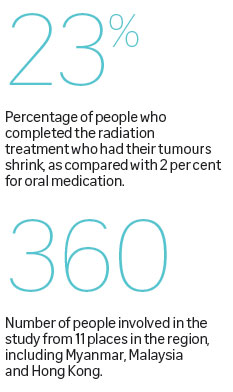A study by NCCS has made findings into the treatment options for patients with intermediate-stage liver cancer, where the tumour is too large to be removed with surgery.
For a long time, patients with intermediate-
stage liver cancer, where
the tumour is too large to be removed
with surgery, had no clear
data on which treatment worked
best.
One type of treatment directs
tiny radioactive spheres to the tumour,
while the other is an oral medication
– sorafenib – that must be
taken as long as the body can bear
the side effects.
But after seven years of research,
a team from Singapore led by National Cancer Centre Singapore (NCCS) surgeon Pierce Chow has
found that half the people on the
oral medication experienced side effects,
compared with just over a quarter for the radiation treatment.
 And of the people who completed
the radiation treatment, 23 per cent
had their tumours shrink, compared
with 2 per cent for oral medication.
And of the people who completed
the radiation treatment, 23 per cent
had their tumours shrink, compared
with 2 per cent for oral medication.
When the tumours shrink, it
means doctors can potentially treat
the problem with surgery or a liver
transplant.
The study, presented at a prestigious
international conference last
month, has given both patients and
doctors more information on
which to base their decisions.
Before the results of the study,
Professor Chow said a liver cancer
patient’s treatment was determined
largely by his doctor’s experience.
“It depended on which doctor
you asked or where you went,” he
said. “Without our trial, this data
would not be known.”
The study involved 360 people
from 11 places in the region, including
Myanmar, Malaysia and Hong
Kong. It was partially funded by
grants from the National Medical
Research Council.
Liver cancer is most common in
Asia and Africa, and is often caused
by the hepatitis B and C viruses or
fatty liver disease.
Around half of all patients in Singapore
are diagnosed in the intermediate
stage, where their tumours
are too big to be removed by
surgery.
The disease ranks among the top
five causes of cancer deaths here,
with around 2,500 people dying of
it between 2010 and 2014.
Associate Professor Teoh Yee
Leong, who is the chief executive of
the Singapore Clinical Research Institute
(SCRI), said the project
nearly did not come to fruition because
it was difficult to secure funding.
The SCRI was involved in the
study as NCCS’ academic partner.
While many clinical trials are typically
funded by pharmaceutical
companies, this particular study
was of no interest to the manufacturers
of either treatment mode.
“In between, there were so many
times we almost gave up,” said Prof
Teoh.
Next, the team is planning to
study how cost-effective each treatment
is, especially when the treatment
of side effects is taken into
consideration.
